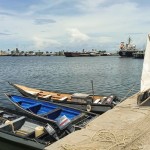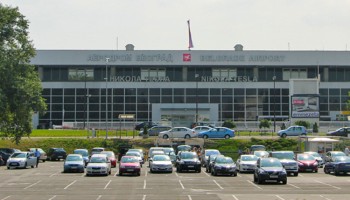"It is a very well organized criminal group which ... over the last ten years has managed to create this Octopus," Tsvetanov said. Police said more arrests were possible after the overnight swoop in the capital Sofia, dubbed Operation Octopus.
The so-called octopus had at least one tentacle in the country’s answer to the FBI – the State Agency for National Security (SANS), which was established in 2008. Former SANS officer Alexei Petrov was among those arrested last week. Petrov survived a shooting last year, and has a lengthy history in both the security services and in the dodgy Bulgarian insurance industry, according to the Sofia Echo. (Bulgaria’s insurance industry sprang out of car theft rackets in the 1990s.) The authorities’ first follow-up raid Wednesday was on the parent company of an insurer thought to be connected to Petrov. Petrov and six other suspects remain in jail as per a Friday court decision in Sofia.
Police seem to be following up on officials’ vows earlier this year to crack down on organized crime. Late last year, police arrested more than 25 people thought to be involved in a kidnapping gang. But there are fears that those arrested may never do time, reported Reuters.
Despite arresting and charging suspects in the past, Bulgaria has failed to convict a single senior official of corruption and has sent to jail only one crime boss.
Of the 25 people arrested in December, only nine remain in custody on charges of kidnapping, while the others have been released on bail or because of lack of evidence, prosecutors said.
Serbia, Montenegro: A Wrangle Over Cocaine Case
Montenegro last week set free three men suspected of involvement in trans-Atlantic cocaine smuggling. One had apparently surrendered to police in the northern town of Berane, but he was released after giving a statement. Two others were released after a Montenegrin court decided there wasn’t enough evidence to hold them, as Serbian authorities investigating the ring had refused to hand over the evidence.
At issue is a cocaine smuggling ring that Serbian authorities disrupted last year in a joint raid with the US DEA in Uruguay that netted two tons of cocaine destined for Europe. The Balkans part of the smuggling ring appears to be made up of Serbs and Montenegrins, but Serbia is hesitant to hand over information to the Montenegrin government, said Serbia’s special prosecutor last week.
(Miljko) Radisavljević said that the Serbian prosecution is currently conducting a “pre-criminal investigation and that delivering the evidence at this stage could completely jeopardize our future work.”
He noted that the Serbian investigation, which was first started against three suspects, is currently being conducted against a total of 24 people.
“This means that the number of persons, criminal offenses and activities being investigated is constantly rising, and is not yet final,” he said.
The gang is no small potatoes. Serbian Justice Ministry’s state secretary said last week that the group was clearing at least €1 billion annually. Slobodan Homen told B92 last week that the group – led by Montenegrin/Serbian fugitive Darko Saric – had laundered their money through sports clubs, privatizations and real estate. He speculated that the group may have also donated money to Serbian political elites.
Homen, who took part in B92 TV's Impression of the Week talk show last night, addressed the issue of whether some of Šarić's illegal wealth went to the country's political parties.
"If I were Šarić, and if I had that kind of money, I would finance all political parties, both in government and opposition, because that's the only reliable protection."
When host Olja Bećković noted that "perhaps that's precisely what he did," Homen said:
"Obviously, that chain broke someplace when this government decided to go for a showdown with him. It's hard to say whether someone financed – history will show."
Meanwhile, Interior Minister Ivica Dacic has ordered an investigation into media claims that his own chief of cabinet had business ties with the Saric gang. Dacic’s cabinet chief, Branko Lazarevic, has denied having ties. Dacic said he won’t rule out resigning if the allegations turn out to be true.
In other crime news, the trial of suspected cigarette smuggling kingpin Stanko Subotic continued in Belgrade last week. He and various others are being tried for allegedly smuggling more than €25 million in cigarettes from 1995 to 1996. To get an idea of how cigarette smuggling permeated all the strata of the powerful in Serbia, check out the list of Subotic’s co-defendants:
There are 12 other persons accused along with Subotić, including former federal customs administration director Mihalj Kertes, paramilitary Scorpions unit founder Milan Milanović, former Novi Sad police chief Miodrag Zavišić, former Novi Sad state security chief Milovan Popivoda, former customs workers Nebojša Nikolić and Drago Dodevski, singer Ivana Olujić, Luka Nenadić and Stevan Banović.
Subotic is also wanted in Italy on the same charges, along with another Serbian businessman, five Montenegrins and seven Italians. Italian prosecutors have archived the case against Montenegrin Prime Minister Milo Djukanovic, because his office gives him immunity from prosecution.
Serbia’s war crimes prosecutor has also opened two cases that have significant overlap with other crimes.
"This trial will for the first time put the emphasis not only on the crimes themselves but also the theft of property that happened alongside the other crimes. This case involved a major robbery; money, gold and other valuables were taken from civilians," the prosecutor said.
He added that all the suspects are now extremely wealthy.
Apparently all of Serbia’s strikes against organized crime – the asset forfeiture laws, the cocaine stings, the drugs sweeps – have prompted criminal groups to start threatening Serbian officials. President Boris Tadic, Interior Minster Dacic, special prosecutor Radisavljevic, and justice ministry officials are all receiving death threats from drug traffickers, reported AFP.
Int’l: US Fingers Russian Government as “Nexus” of Organized Crime
US intelligence services have for the first time fingered Russia and other regional governments for colluding with organized crime. In a report out earlier this month, US director of national intelligence Dennis Blair said international organized crime and its alliances with government officials were a threat to the US:
At one end of the spectrum is the apparent growing nexus in Russian and Eurasian states among government, organized crime, intelligence services, and big business figures. An increasing risk from Russian organized crime is that criminals and criminally linked oligarchs will enhance the ability of state or state-allied actors to undermine competition in gas, oil, aluminum, and precious metals markets.
Blair’s naming of Russia marks a departure from the usual diplomatic language about “Eurasian” or “Eastern European” crime groups. The website Main Justice, which covers the US Justice Department, reported that US officials are taking the threat seriously after years of neglect.
In recent weeks, the new intelligence findings have been briefed around Washington at the highest levels, including to President Barack Obama and congressional leaders of the intelligence committees, according to people with direct knowledge of the matter.
The findings are likely to have a big impact on the Department of Justice, where the Organized Crime and Racketeering Section has been starved for resources as funding shifted to the fight against Islamic terrorism. The FBI’s small organized crime shop, which is woefully lacking in Slavic language experts, may also see a boost.
The major message of the new intelligence review is that far more funding needs to be directed toward fighting sophisticated international organized crime groups.
The Justice Department has asked for $15 million to fund anti-international organized crime measures for the 2011 fiscal year. The same department announced last week that it was creating an intellectual property task force to end the billions of dollars in losses caused by copyright piracy.
In other international news, financial police in Milan said last week that a group of Italians working for an organized crime group had netted themselves €15 million by running a pump-and-dump scheme with stock in a US-based mining company.
Italy: Two arrested in Duisberg Murders
Italian police arrested two suspects over the so-called “Duisberg massacre,” in which six Italians were gunned down outside a pizza parlor in Duisberg, Germany, in 2007. Officials said that all three people suspected of committing the murders have now been arrested. The murders are believed to have been part of a feud between two clans of the southern Calabrian region’s ‘Ndrangheta organized crime group, and marked the first time that ‘Ndrangheta killings took place outside Italy.




